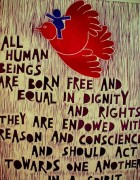The average user checks their phone about 110 times a day. For something we spend so much time on, how much do we really know about it? Unfortunately, the more we know, the worse the story becomes.
Samsung has a Global Code of Conduct that insures fair treatment of workers, including protecting their health and safety, and a refusal to hire underage workers. Evidence shows that not only is Samsung violating international and national labor laws, but the company is violating its own code. The investigative report of BBC One Panorama following the making of iPhones shows that Apple certainly isn’t setting a better example. Unreasonably long shifts at Chinese factories and child labor in the Indonesian tin industry do not measure up to their supposed labor standards.
Certain minerals are needed to make smartphones. Coltan (columbite tantalite) is used to make the circuit board for the iPhone. So much slavery and violence surround the mining of coltan that it has been called the “blood mineral.” No rules or regulations protect children as young as ten years old who work like slaves to mine this mineral. Lethal accidents are common. The money from coltan mines goes to warlords who continue the violence in order to protect their territory.
In 2011, the United States passed the Dodd Frank Wall Street Reform and Consumer Protection Act, which requires the Security and Exchange Commission (SEC) to certify that the companies’ products do not use minerals mined from the Democratic Republic of the Congo (DRC) and do not fund conflict and human rights abuses in the region. The money from the minerals is funding armed conflict, rape and sexual slavery. The SEC is still working on defining clear standards, which means the money from mining these minerals continues to fuel conflict.
Tin is also needed for smartphones. The BBC One Panorama report verified that Apple used illegal suppliers of tin who relied on child labor. Young boys help their fathers mine tin from cliffs of sand, constantly in fear of landslides that would crush and kill them. However, there is not a clear solution for eliminating child labor in tin mining. For example if Apple refused all tin from Indonesia, iPhones would not rely on child mining. However this would not stop children from working dangerous jobs there. It is a complicated problem with perhaps even more complicated solutions.
However, some supply chain issues are easier to fix. China Labor Watch sent people undercover to investigate Shinyang Electronics, a supplier of Samsung. In three days, these investigators found five workers under 16 years old, some working 11-hour shifts. Child workers make the equivalent of $1.20 an hour. Shinyang also does not give sufficient safety training and sometimes only hires males. The good news is Samsung says it will investigate the report from China Labor Watch. Samsung claims that they have investigated for child labor and did not find any in their supply chain, probably because the children working at Shinyang Electronics had fake IDs. However China Labor Watch investigators were able to identify the true age of the children by comparing their real IDs with their employee IDs.
This is not the only incident of troubles with Samsung’s supply chain. A 23-year-old employee at a Samsung factory in Korea died of leukemia, and many claim the death was linked exposure to chemicals at work. Samsung publically apologized and offered compensation to the family, yet will not admit that the two events were linked.
Workers are falling asleep at work in factories that make iPhones in China. They sometimes work 16-hour days or 18 days straight in a row. Apple created standards of worker treatment after 14 suicides in one factory, but these standards were immediately broken.
At the very least, we should hold these companies responsible for maintaining the standards that they set. Conditions in factories in China and Korea should not be so bad that workers are committing suicide, especially if companies have created standards for good labor conditions. Last September, Xu Lizhi jumped out of a window of a Foxconn building a China, one of the companies that makes iPhones. Unfortunately, this in itself does not make a sensational story, because of the high rates of suicides at these factories. What sets Xu Lizhi apart is that he was also a poet, using art to give voice to the suffering of factory workers. He wrote:
We ran along the railway,
arriving in some place called ‘the City’
where we trade in our youth, and our muscle.
Finally we have nothing to trade, only a cough
and a skeleton nobody cares about.
Mary Donovan
photo – Foxconn (thepoetryfoundation.org)

